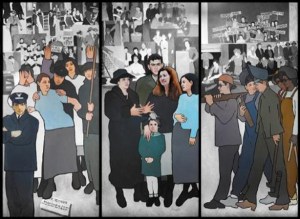BANGOR, Maine — A federal judge on Friday ruled in favor of Gov. Paul LePage in a lawsuit concerning the governor’s controversial removal of a Department of Labor mural, saying LePage’s action amounted to “government speech.”
In a 90-page opinion, U.S. District Judge John A. Woodcock Jr. granted motions for summary judgment in favor of LePage and members of his administration. The judge also dismissed two counts of an amended complaint filed by the plaintiffs.
The decision essentially denied a trial of the lawsuit seeking to compel LePage to restore the mural to the walls of the Department of Labor building in Augusta.
“The prospect of [hauling] a sitting governor into federal court to be cross-examined under oath as to why he made a political decision may momentarily cheer the partisan,” Woodcock wrote. “But the long-term implications of federal court intervention in state politics are sobering.”
The judge said that because Maine owns the mural, it is free to do what it wants with the artwork.
“The record establishes that the idea for the commissioning of the mural began with the state of Maine, that Maine established its theme, that Maine commissioned its creation, that Maine chose the artist, that Maine paid for the mural, that Maine owns the mural, that Maine displays [or not] the mural on its own property, and that Maine even has the right to destroy it,” Woodcock wrote.
The judge said the state of Maine engaged in “government speech” when it commissioned and displayed the mural.
“It follows that Gov. LePage also engaged in government speech when he removed the mural,” Woodcock wrote. “The governor’s message — whether verbal or in the form of the expressive act of removal — is government speech.”
“Regardless of Judge Woodcock’s opinion, while we may not have yet prevailed in the court of law, we already have prevailed in the court of public opinion,” the plaintiffs’ attorney, Jeffrey Neil Young, said in a statement. “Mainers recognize what the court has failed to appreciate, that the removal of the mural is nothing less than government censorship of artistic speech in violation of the First Amendment.”
Young added that the plaintiffs were still studying the opinion and would decide in the near future whether to appeal the ruling to the 1st Circuit Court of Appeals in Boston.
“We’ve always believed that this was a frivolous, politically motivated lawsuit,” said LePage spokeswoman Adrienne Bennett. She said it would be “stunning” if government officials were barred from making decisions about what artwork can hang in public buildings.
Brooksville artist Robert Shetterly, one of three Maine artists named as plaintiffs in the lawsuit, expressed disappointment at Woodcock’s ruling.
“I have found Judge Woodcock to be an astute and thoughtful person,” Shetterly said Friday in a telephone interview. “However, I think he’s wrong about this being a matter of government speech. His decision is basically timid. I think it’s a sad decision.”
Shetterly, who travels to classrooms throughout Maine and across the country to speak about his “Americans Who Tell The Truth” series of portraits, said the ruling wasn’t a total surprise to him since Woodcock earlier had expressed reluctance to intervene in the matter. Shetterly said Woodcock had earlier suggested the “best remedy was the ballot” instead of a court ruling.
“The whole doctrine of government speech is a fallacious one,” he said. “This is just honest history, pure and simple. No one can argue with the depiction of Maine’s labor history that’s in the mural.”
BDN staffer William P. Davis contributed to this report.

Comments are no longer available on this story